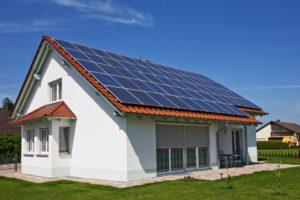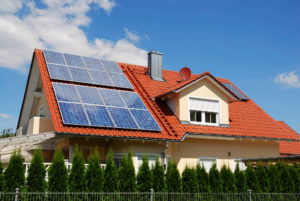With solar panels’ increasing popularity and environmental benefits, many homeowners wonder if they can also make financial gains from this renewable energy source. This article will explore the potential for making money with solar panels and how homeowners can benefit financially while contributing to a sustainable future.
Contents
Key Takeaways
- You can make money with solar panels by participating in net metering programs, selling excess energy back to the grid, and earning credits or payments from utility companies.
- Investing in solar panels offers long-term financial returns through reduced energy costs and potential income generation.
- Selling solar panels and providing solar-related services present opportunities to enter the solar industry and capitalize on the growing demand for renewable energy solutions.
Understanding Solar Panel Systems
To fully grasp solar panel systems’ functionality and components, it’s crucial to delve into the details. Here’s a breakdown of the key aspects:
Solar Panels and Photovoltaic Cells
- Solar Panel Structure: Explore the physical structure of solar panels, consisting of multiple photovoltaic cells arranged in a grid-like pattern. These cells are typically made of silicon and are responsible for converting sunlight into electricity.
- Photovoltaic Effect: Understand the process by which photovoltaic cells generate electricity. When sunlight strikes the cells, photons from the sunlight’s energy dislodge electrons in the silicon atoms, generating an electric current.
Components of a Solar Panel System
- Inverters: Discuss the role of inverters in solar panel systems. Inverters convert the direct current (DC) electricity generated by solar panels into alternating current (AC), compatible with home and business electrical systems.
- Mounting Structures: Explain the importance of mounting structures that securely hold solar panels in place, optimizing their exposure to sunlight. Different mounting options include rooftop installations, ground-mounted systems, and solar tracking mechanisms.
- Wiring and Electrical Connections: Highlight the significance of proper wiring and electrical connections in a solar panel system. These connections link the solar panels to the inverter and the electrical grid, ensuring a smooth flow of electricity.
- Monitoring Systems: Introduce the role of monitoring systems that track the performance of solar panel systems. These systems provide real-time data on energy production, enabling homeowners to monitor their system’s efficiency and troubleshoot any issues.
Grid Connection and Net Metering
- Grid Connection: Explain the connecting solar panel systems to the electrical grid. When a solar panel system produces excess electricity, it flows into the grid for other consumers, creating a symbiotic relationship between the solar system and the grid.
- Net Metering: Explore the concept of net metering, whereby homeowners receive credits or payments for the surplus electricity they generate. Excess electricity is fed back into the grid during low energy consumption, offsetting energy drawn from the grid during higher consumption periods.

Generating Solar Power and Net Metering
Understanding how solar power is generated and how net metering works is essential for maximizing the benefits of a solar panel system. Here’s a comprehensive explanation:
Solar Power Generation
- Sunlight Capture: Discuss how solar panels capture sunlight using their photovoltaic cells. These cells absorb photons from sunlight, initiating the photovoltaic effect and generating a flow of electrons.
- DC to AC Conversion: Explain the role of inverters in converting the direct current (DC) electricity generated by solar panels into the alternating current (AC) used by homes and businesses. This conversion allows solar energy to power electrical devices and appliances.
Net Metering Process
- Surplus Energy Flow: Illustrate how excess energy produced by solar panels flows back into the electrical grid. When the solar panel system generates more electricity than is consumed, the surplus energy is returned to the grid.
- Metering and Billing: Explain the metering process involved in net metering. Utility companies measure the energy flow in both directions, tracking the energy homeowners consume from the grid and the energy they contribute. Billing is typically based on the net energy consumed over a billing period.
- Credit Accumulation: Highlight how homeowners accumulate credits when they produce more energy than they consume. Depending on local regulations, these credits can offset future electricity bills or potentially result in payments from utility companies.
By understanding the fundamentals of solar panel systems, including the generation of solar power and the workings of net metering, homeowners can maximize the benefits of their solar panel systems and make informed decisions regarding their energy usage and potential financial gains. Understanding how solar panels convert sunlight into electricity through the photovoltaic effect and the components that make up a solar panel system provides a solid foundation for harnessing solar energy effectively.
Investing in Solar Panels for Financial Returns
Investing in solar panels can yield substantial financial returns over the system’s lifespan. While the upfront costs may seem significant, the long-term benefits and potential savings make it worthwhile. Here are key factors to consider:
Estimating Financial Returns
Determining the financial returns of a solar panel system involves evaluating various factors:
- System Size and Generation: Larger solar panel systems generate more electricity, resulting in greater savings on electricity bills and potential income from excess energy.
- Electricity Rates: High electricity rates increase the value of the electricity produced by solar panels, enhancing the financial benefits.
- Incentives and Financing: Tax credits, rebates, and grants significantly reduce upfront costs. Financing options can also make solar installations more financially accessible.
Long-Term Benefits
Solar panel systems are considered long-term investments with warranties spanning 20 to 25 years. Over time, benefits accumulate, including:
- Energy Cost Savings: Homeowners reduce their reliance on traditional electricity sources by generating electricity from the sun, resulting in long-term cost savings.
- Potential Income from Net Metering: Excess energy sent back to the grid through net metering can earn credits or payments, further offsetting electricity costs.
- Increased Property Value: Solar panel installations can increase the value of a property, making it more attractive to potential buyers if you decide to sell.

Selling Solar Panels and Solar Services
Entering the solar industry offers opportunities to sell solar panels and provide related services. Here’s how individuals can capitalize on this growing market:
Selling Solar Panels
- Understanding Customer Needs: Conduct comprehensive consultations, including site assessments, to determine the most suitable solar panel system for customers’ properties.
- Building Trust: Offer transparent pricing, warranty information, and reliable customer support to establish trust and increase sales.
- Tailored Solutions: Provide personalized recommendations considering homeowners’ energy goals, financial situations, and specific property requirements.
Solar Service Provision
- Maintenance and Monitoring: Offer system inspections, panel cleaning, and troubleshooting services to ensure optimal performance and maximize system lifespan.
- Ongoing Support: To maintain long-term customer satisfaction, provide post-installation support, including warranty assistance and system upgrades.
- Energy Efficiency Consulting: Offer advice on energy-saving practices, complementary technologies (such as smart home devices), and maximizing energy efficiency alongside solar installations.
Solar Project Development
- Identifying Opportunities: Explore potential locations for solar installations, considering available space, solar resource availability, and local regulations.
- Securing Financing: Assist homeowners or businesses in securing financing options for solar projects, such as loans or power purchase agreements.
- Project Management: Oversee the entire solar project lifecycle, from planning and permitting to installation and commissioning, ensuring timely completion and adherence to quality standards.
Second-Hand Solar Panels
- Reselling Opportunities: With the increasing popularity of solar panels, there is a demand for second-hand panels. Consider establishing a business to buy and resell used solar panels, providing an affordable option for customers on a budget.
- Quality Assurance: Conduct thorough inspections and verifications to ensure the reliability and performance of second-hand solar panels before resale.
By understanding the financial aspects and seizing opportunities in selling solar panels and providing solar-related services, individuals can benefit financially while contributing to the widespread adoption of clean and sustainable energy.
Experience Solar Excellence with Us!
Trust in Solar Panels Network USA, where our seasoned experts deliver top-quality solar solutions for homes and businesses nationwide. With a legacy of countless successful installations and a commitment to sustainable energy, we’re your reliable partner in the solar journey. Ready for a brighter, eco-friendly future? Call us now at (855) 427-0058 and harness the power of the sun!
Conclusion
Whether you can make money with solar panels is answered with a resounding yes. Solar panels offer environmental benefits and present financial opportunities for homeowners. Through net metering, selling excess energy, and participating in the solar industry, homeowners can save on electricity bills, earn income, and contribute to a cleaner future.
Investing in solar panels provides long-term financial returns by reducing energy costs and potentially generating income from excess energy. By estimating financial returns, considering incentives, and understanding the long-term benefits, homeowners can make informed decisions about installing solar panels and reaping the rewards.
Selling solar panels and providing solar-related services allow individuals to enter the growing solar industry. By understanding customer needs, building trust, and offering tailored solutions, entrepreneurs can capitalize on the demand for solar installations and maintenance services. The market trends and opportunities in the solar industry make it an attractive venture for those seeking financial gains and a chance to contribute to the renewable energy transition.
Furthermore, solar panel systems enable homeowners to generate clean energy and contribute to a sustainable future. Homeowners can optimize their energy usage and maximize their solar investments by understanding the functionality of solar panel systems, including solar power generation and net metering.
Solar panels offer a viable solution in a world where energy costs are rising, and environmental concerns are at the forefront. Not only can homeowners reduce their reliance on the grid and save on electricity bills, but they can also actively participate in the renewable energy revolution. By embracing solar power, homeowners can positively impact the environment, create financial opportunities, and lead the way toward a greener and more sustainable future for future generations.
About the Author
Solar Panels Network USA stands at the forefront of solar energy solutions, driven by a team of seasoned solar engineers and energy consultants. With over decades of experience in delivering high-quality solar installations and maintenance, we are committed to promoting sustainable energy through customer-centric, tailored solutions. Our articles reflect this commitment, crafted collaboratively by experts to provide accurate, up-to-date insights into solar technology, ensuring our readers are well-informed and empowered in their solar energy decisions.

